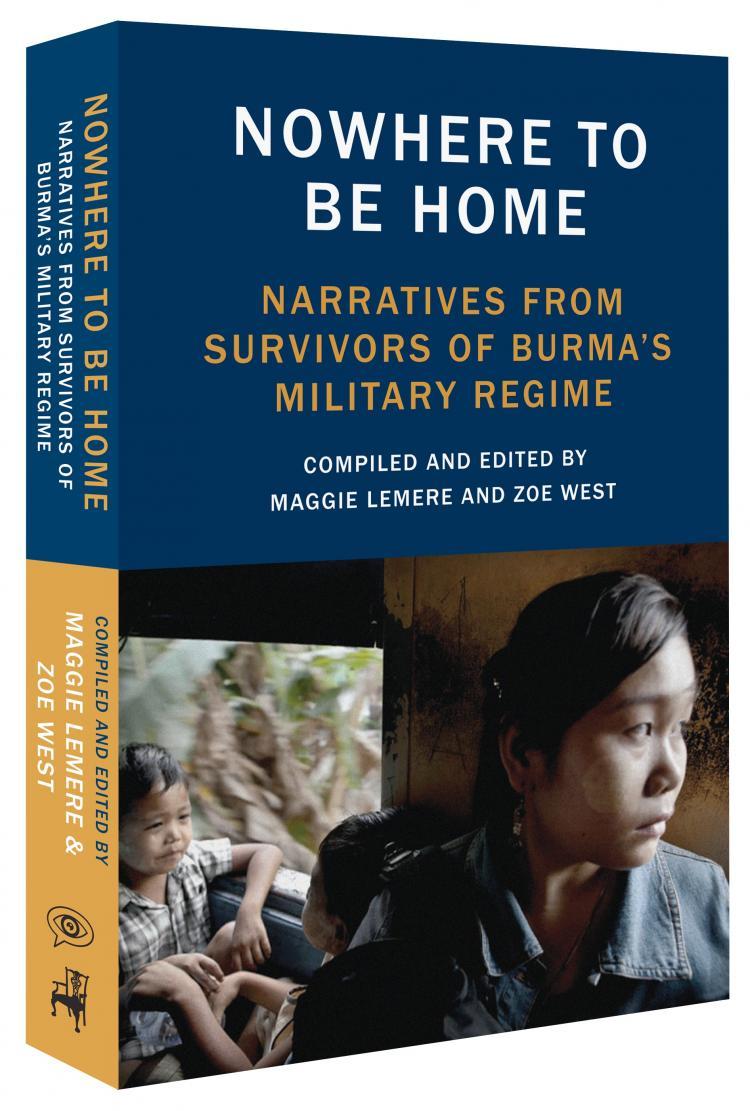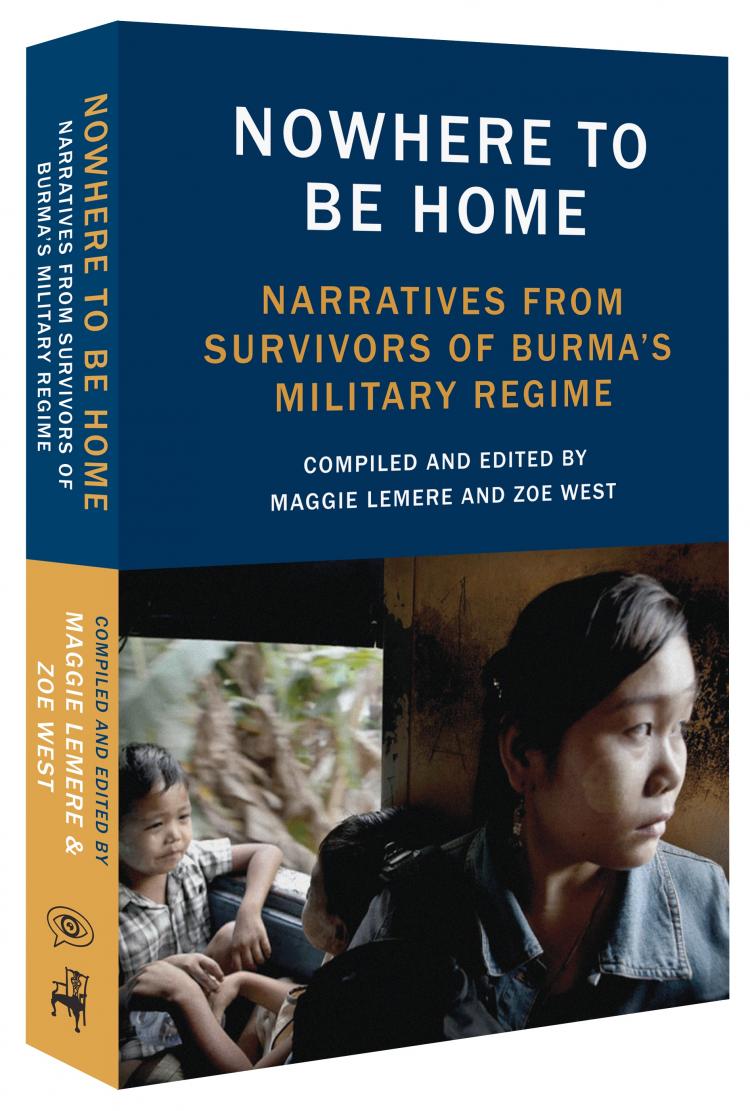A young boy recruited at the age of 9 to become a child soldier; a photojournalist risking his life to capture the events of the 2007 Saffron monk uprising; students protesting against the military regime—these are some of the stories recorded in Voice of Witness’s latest book, Nowhere To Be Home: Narratives From Survivors of Burma’s Military Regime.
Voice of Witness is a nonprofit dedicated to publishing a book series documenting human rights crises around the world through oral testimonies of survivors. Based in San Francisco, they focus on issues that are underreported in the media, and seek to bring the atrocities to light by publishing highly readable accounts for the general public.
Nowhere To Be Home is the seventh volume of the series. Previous volumes reported on the conflict in Sudan and Zimbabwe, while publications on domestic issues include testimonies from survivors of Hurricane Katrina and the nation’s illegal immigrants.
On March 29, Voice of Witness and Columbia University’s Oral History Research Office held a public discussion on the injustices occurring in Burma. Featured speakers included Heath Marciniec of the Open Society Institute; Mimi Lok, executive director of Voice of Witness; and Maggie Lemere and Zoë West, editors of Nowhere To Be Home and principal interviewers of the Burma project.
Nowhere To Be Home, like other books in the Voice of Witness series, are collections of long-form essays that are compiled from extended interviews with survivors. The survivors come from different religious and ethnic backgrounds, their stories offering a multifaceted perspective on the conflict. Some were members of the National League for Democracy, the political party led by Aung San Suu Kyi; others have worked for the military junta but have since escaped.
Lok addressed the importance of these oral histories, which provide readers with a “ground’s eye view” of the human rights abuses happening across the globe. Oftentimes, these international crises may seem abstract, far-fetched, and unimaginable to ordinary readers, but with real-life stories and personas, readers can connect with the conflicts at an emotional level.
Readers become empathetic to the afflicted, and come to understand the survivors as “complex individuals” with flaws and weaknesses, like every human being, Lok noted. By increasing the world’s awareness of these brutalities, Voice of Witness hopes to bring international pressure to the oppressive governments and regimes. Their work has provided invaluable research material for a number of solidarity, lobbying, and public policy groups, such as Amnesty International and Human Rights Watch.
The true value of these personal testimonies lies in the fact that through recording their stories, survivors become agents of history, instead of being silenced forever by their government. These victims are finally given a voice, but often at great personal risk. From political prisoners who have just been released, to those who are at risk of exposure to spies and infiltrators, the interviewees are often risking their lives to share their experiences with the world.
Voice of Witness’s literary approach to their essays make their books very readable and accessible to a large audience. The “novelistic level of detail,” Lok said, provides an appealing account that can attract more readers, even those who were not previously informed of the situation in Burma. While at a high school reading excerpts from the book, Lok noted students especially related to the story of the 9-year-old child soldier and became interested in learning more about the crisis in Burma, attesting to the effectiveness of these stories for education programs.
The speakers also discussed their interviewing and editing process. Interviewers usually ask comprehensive questions to elicit detailed responses, though it is sometimes difficult due to the survivors’ fear of implication. However, Lok noted that in their editing, they try their best to “maintain the integrity of their voice” and convey the oppressive environment there.
Finally, Maggie Lemere and Zoë West expressed that they hope Voice of Witness’s narratives will help people understand “the nuances and gray areas” behind the complicated situation in Burma, rather than the often one-sided perspective reported in the media.
Nowhere To Be Home, is available for $20.00 from McSweeney’s .
Voice of Witness is a nonprofit dedicated to publishing a book series documenting human rights crises around the world through oral testimonies of survivors. Based in San Francisco, they focus on issues that are underreported in the media, and seek to bring the atrocities to light by publishing highly readable accounts for the general public.
Nowhere To Be Home is the seventh volume of the series. Previous volumes reported on the conflict in Sudan and Zimbabwe, while publications on domestic issues include testimonies from survivors of Hurricane Katrina and the nation’s illegal immigrants.
On March 29, Voice of Witness and Columbia University’s Oral History Research Office held a public discussion on the injustices occurring in Burma. Featured speakers included Heath Marciniec of the Open Society Institute; Mimi Lok, executive director of Voice of Witness; and Maggie Lemere and Zoë West, editors of Nowhere To Be Home and principal interviewers of the Burma project.
Nowhere To Be Home, like other books in the Voice of Witness series, are collections of long-form essays that are compiled from extended interviews with survivors. The survivors come from different religious and ethnic backgrounds, their stories offering a multifaceted perspective on the conflict. Some were members of the National League for Democracy, the political party led by Aung San Suu Kyi; others have worked for the military junta but have since escaped.
Lok addressed the importance of these oral histories, which provide readers with a “ground’s eye view” of the human rights abuses happening across the globe. Oftentimes, these international crises may seem abstract, far-fetched, and unimaginable to ordinary readers, but with real-life stories and personas, readers can connect with the conflicts at an emotional level.
Readers become empathetic to the afflicted, and come to understand the survivors as “complex individuals” with flaws and weaknesses, like every human being, Lok noted. By increasing the world’s awareness of these brutalities, Voice of Witness hopes to bring international pressure to the oppressive governments and regimes. Their work has provided invaluable research material for a number of solidarity, lobbying, and public policy groups, such as Amnesty International and Human Rights Watch.
The true value of these personal testimonies lies in the fact that through recording their stories, survivors become agents of history, instead of being silenced forever by their government. These victims are finally given a voice, but often at great personal risk. From political prisoners who have just been released, to those who are at risk of exposure to spies and infiltrators, the interviewees are often risking their lives to share their experiences with the world.
Voice of Witness’s literary approach to their essays make their books very readable and accessible to a large audience. The “novelistic level of detail,” Lok said, provides an appealing account that can attract more readers, even those who were not previously informed of the situation in Burma. While at a high school reading excerpts from the book, Lok noted students especially related to the story of the 9-year-old child soldier and became interested in learning more about the crisis in Burma, attesting to the effectiveness of these stories for education programs.
The speakers also discussed their interviewing and editing process. Interviewers usually ask comprehensive questions to elicit detailed responses, though it is sometimes difficult due to the survivors’ fear of implication. However, Lok noted that in their editing, they try their best to “maintain the integrity of their voice” and convey the oppressive environment there.
Finally, Maggie Lemere and Zoë West expressed that they hope Voice of Witness’s narratives will help people understand “the nuances and gray areas” behind the complicated situation in Burma, rather than the often one-sided perspective reported in the media.
Nowhere To Be Home, is available for $20.00 from McSweeney’s .








